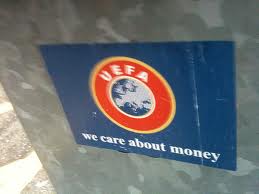By Mark Baber
February 5 – The challenge of keeping club costs under control and within sustainable limits has been at the heart of the European Club Licensing Benchmarking Report which is now providing a measuring stick for what UEFA terms fair financial play and how the governing body will implement the rules and, most likely, enforce them.
According to the report the sustainability of the entire football sector is at the centre of the financial fair play philosophy, aimed at balancing revenues with expenses and at boosting investments for the long-term health of the game.
Already the May 2010 regulations passed by UEFA’s executive committee are impacting with the first phase of financial fair play leading to a reduction in the level of overdue debts on transfers and employee payments as clubs realise tough action is and will be taken.
All clubs participating in UEFA club competitions (237-239 under current competition formats) will be subject to financial monitoring by the Club Financial Control Body.
All clubs competing in the 2012/13 UEFA club competitions were monitored in summer 2012 to ensure that they had met their transfer payments and salary obligations to their staff. In addition, some clubs that triggered risk indicators were subject to additional monitoring in the autumn.
Starting in July 2013, clubs above a certain size will fall within the scope of the break-even rule. The report shows 41% of the clubs in the 2012/13 UEFA competitions would have been exempt from the break-even requirements, but only two of the clubs that reached the knockout stage.
Those low-risk clubs that report a positive break-even result each year and pass other risk indicators will not have to provide any more information, whilst those that breach a risk indicator will have to provide current information and also future financial information, including a future plan for compliance with the break-even calculation.
The report indicates that on this historic basis, even in the non-financial fair play environment, 79% of clubs competing in UEFA club competitions would either be exempt or definitely satisfy the break-even criteria.
If the pre-financial fair play results were replicated in the future then 46 clubs from 22 countries would at least require contributions from equity participants and/or related parties covering their deficit, and some would breach the break-even requirements.
In a simulation covering FY2009, FY2010 and FY2011, 14 of the clubs participating in the 2012/13 UEFA Champions League or UEFA Europa League reported cumulative break-even deficits in excess of €45m with a further 32 clubs reporting losses of between €5m and €45m, necessitating equity investments/recapitalisation before the year-end of up to €40m.
In total, 62% of European clubs (407 out of 654) breached at least one indicator and hence would have been required to provide additional information to the Club Financial Control Body, if
The report tackles the question of whether the regulations will actually have teeth, pointing to the long list of clubs that qualified for the UEFA Champions or Europa Leagues (formerly UEFA Cup) on sporting merit but were refused access to the competition on licensing grounds.
Six clubs that had qualified for the 2012/2013 UEFA club competitions on sporting merit, including Rangers who had qualified for the UEFA Champions League but were not granted access to the competition on club licensing and financial fair play grounds.
Gyori of Hungary was refused access to a UEFA competition on the basis of a compliance visit and AEK and Besiktas were refused access to the UEFA Europa League for breaching financial fair play overdue transfer payables criteria, as a result of investigations by the Club Financial Control Panel whilst competition funds were withheld from 23 clubs.
The introduction of financial fair play, the report shows, has already had a significant effect on the level of overdue payables of European clubs.
The latest assessment at the end of September 2012 revealed an overdue balance of €18.3m, which is a 68% decrease compared to the first assessment at the end of June 2011.
Contact the writer of this story at moc.l1744529142labto1744529142ofdlr1744529142owedi1744529142sni@o1744529142fni1744529142

